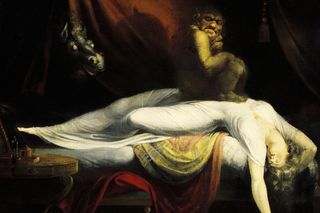Sleep Paralysis Is Linked to Stress (and Supernatural Beliefs)

Have you ever dozed off for a 30-minute nap and woken up with a demon perched on your chest, pinning you to your bed?
English folklore once dubbed such nocturnal visitations as simply "nightmares." Today, however, the phenomenon is called sleep paralysis — or being mentally aware while falling asleep or waking up, yet totally unable to move. These episodes may last only a few minutes but can include disquieting side effects such as an intense pressure felt on the sleeper's chest, the sensation of being watched by an intruder and other sensory hallucinations.
Sleep paralysis "occurs when features of REM sleep, specifically muscle paralysis, continue into our waking lives," said Alice Gregory, a professor of psychology at Goldsmiths University of London. (REM, or rapid eye movement, sleep is the stage of sleep when dreaming takes place.) [11 Spooky Sleep Disorders]
Though scientists have an understanding of what happens during sleep paralysis, the cause of the condition remains unclear.
So, in a recent review of studies, published in June in the journal Sleep Medicine Reviews, Gregory and her colleagues analyzed 42 sleep paralysis studies to determine the most common characteristics linked with the mysterious condition. In the review, the researchers compared the frequency of sleep paralysis episodes with dozens of variables, including age, sex, ethnicity, diet, income, caffeine intake, genetics, past stress, "hypnotizability" and IQ.
Many of these factors showed negligible or inconclusive links, but there was little doubt that poor sleep quality was associated with sleep paralysis episodes. Broadly speaking, the less restful a person's sleep was, the more likely they were to experience sleep paralysis, the review found.
"Overall, it seems that certain factors associated with disrupted sleep are also linked to sleep paralysis," Gregory said. "For example, disturbed sleep is common amongst those who use substances[drugs], experience stress and report psychiatric difficulties."
Sign up for the Live Science daily newsletter now
Get the world’s most fascinating discoveries delivered straight to your inbox.
Across multiple studies, individuals who woke up repeatedly during the night were significantly more likely to experience paralysis episodes than sound sleepers were. In several studies that looked at sleep duration, individuals who slept for less than 6 hours or more than 9 hours at a time were most likely to experience sleep paralysis upon waking. Napping was also linked to increased chances of sleep paralysis episodes.
"This makes sense when we think about the likely mechanisms underlying sleep paralysis," Gregory said, which occurs when a person is essentially caught between REM sleep and wakefulness.
Stress and anxiety may also be linked with a person's likelihood to experience sleep paralysis, the review found. Patients who had been diagnosed with post-traumatic stress disorder (PTSD) showed significantly higher rates of sleep paralysis across multiple studies compared with patients without PTSD. To a lesser extent, people who were prone to social anxiety and general stress were also more likely to experience sleep paralysis episodes than those without these conditions. And several studies found a link between sleep paralysis and regular nightmares.
"It could be that stress causes sleep paralysis, but equally that sleep paralysis leads to stress," Gregory said. "We couldn't really tease apart cause and effect." Future long-term studies will help clarify what comes first: sleep problems or anxiety, she added.
The truth is out there?
Descriptions of sleep paralysis have appeared in global folklore for centuries, often linking the symptoms to visits from supernatural creatures such as witches, ghosts, genies and a particularly lusty breed of demon called incubi. In some more recent cases reported in the United States, episodes of sleep paralysis have also been interpreted as alien abductions.
Previous studies have looked into whether people's cultural backgrounds — specifically, how strongly their cultures fear and mythologize sleep paralysis — translate to actual sleep paralysis episodes.
The new review looked at three such studies that examined "paranormal and mystic beliefs" as a possible factor in people's sleep paralysis episodes. Of these studies, two found that people who experienced sleep paralysis were more likely to have supernatural beliefs than people who didn't experience sleep paralysis. But overall, supernatural notions appear to be less involved in sleep paralysis compared with sleep quality and stress, the researchers said.
Originally published on Live Science.

Brandon is the space/physics editor at Live Science. His writing has appeared in The Washington Post, Reader's Digest, CBS.com, the Richard Dawkins Foundation website and other outlets. He holds a bachelor's degree in creative writing from the University of Arizona, with minors in journalism and media arts. He enjoys writing most about space, geoscience and the mysteries of the universe.

